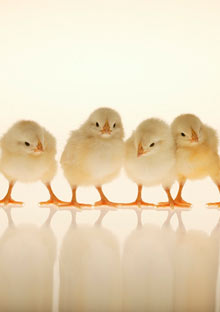How to Break the Ice

Photo: © 2009 Jupiterimages Corporation
Hello, how are you, my name is...then what? From Daniel Menaker— editor, writer, conversationalist extraordinaire—a few words on how to talk the talk.
I think it was a famous city planner who said that if you build a statue or a sculpture or some similar object and put it on the sidewalk, you will often find several people looking at it and talking to each other about it, even if they don't know each other. The object is a perfect conversation starter. So I have developed a theory—the theory of the third—which says that neither person should start a conversation by talking about himself or the other person directly. Instead, you have to find a third subject, a third person, or an object to begin the conversation around. I had a perfect example the other night. I was doing a crossword puzzle while waiting in line for a movie, and this guy next to me, whom I didn't know, said, "Well, you're four days late," because it was the Sunday crossword and this was a Thursday. And of course, even though he was commenting on something I was doing, it wasn't a question about me. It wasn't invasive—"What do you do?" "Who are you?" "What's your name?" It was something in between that we could converse about. At the same time, this guy was a little impudent—he was looking over my shoulder—and I liked that, too, but the fact is, he wasn't commenting on what I was wearing or really on anything about me. And because he just talked about the puzzle, it led to a conversation.
The theory of the third explains why the weather is such a common resort. Unfortunately, it's so common as to be clichéd, but at least it's an attempt at neutrality—like commenting on the interesting color of the wall you're standing next to. And that's the best way to start a conversation, with an attempt at neutrality. This sounds like lame advice, but it's not. What you're saying is "I'm not going to invade your privacy, and you're not going to invade mine. We'll test each other out by talking about something that seems inconsequential and see if we want to deepen this a bit."
Now, in terms of ending a conversation, I had an aunt who was a Quaker, and she and my uncle used to have people over for dinner, and sometimes when the guests got up to leave, they would trail on and on and on and just keep talking—until my aunt, who was a terrifically nice, cherubic person, would finally say, "Thee may go, or thee may stay, but don't ooze."
And by the way, the guy from the movie line? We're going to have lunch.
This story is part of O's Live Your Best Year Toolkit
Next: 4 things that are fine the way they are
Daniel Menaker's new book, A Good Talk: The Story and Skill of Conversation (Twelve), comes out in January.



